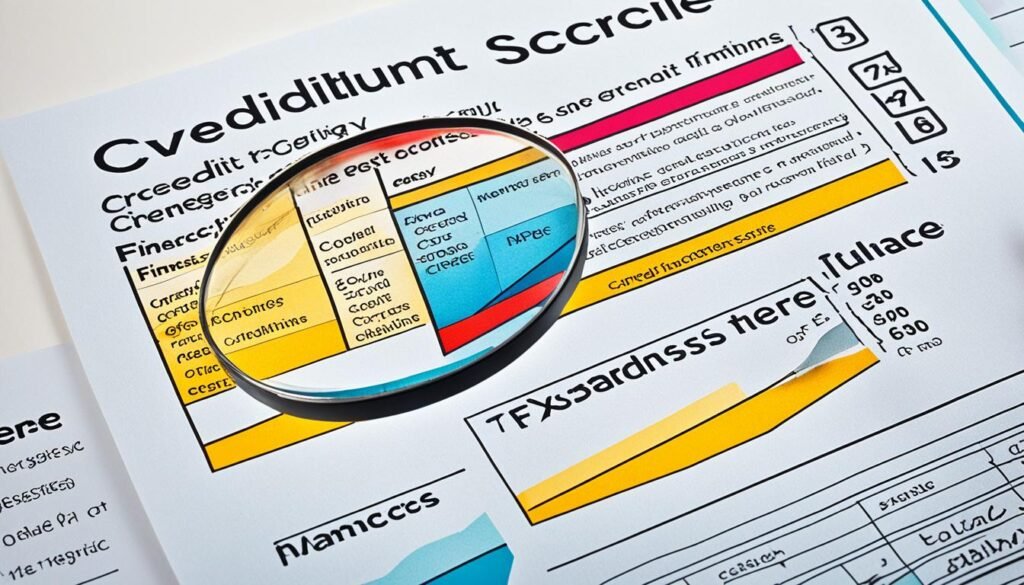A finance charge is a fee that you incur when using your credit card or borrowing money. It can have an impact on your credit score and financial health. Understanding how finance charges work and how to manage them effectively is crucial. Let’s explore the relationship between finance charges and credit scores in detail.
Key Takeaways : Finance Charges
- Finance charges are fees imposed by credit card companies or lenders for the use of credit.
- They include various types of charges such as interest charges, transaction fees, and annual fees.
- The calculation of finance charges depends on the type of charge and the terms of your credit card or loan agreement.
- Types of finance charges include interest charges, cash advance fees, balance transfer fees, penalty fees, and foreign transaction fees.
- Finance charges, particularly interest charges and penalty fees, can impact your credit score and creditworthiness. It is important to manage them effectively.
What Are Finance Charges?
Finance charges are fees imposed by credit card companies or lenders for the use of credit. These charges can include a variety of fees such as interest charges, transaction fees, and annual fees. Each financial institution may have different types of finance charges, and the specific charges can vary. It is important to carefully review the terms and conditions of your credit card or loan agreement to understand the finance charges that may apply to you.
Interest charges are a common type of finance charge. When you carry a balance on your credit card, the credit card company will charge you interest on that balance. This interest charge is calculated based on the annual interest rate, also known as the Annual Percentage Rate (APR). It is important to note that interest charges can accumulate over time, meaning the longer you carry a balance, the more interest you will pay.
Transaction fees are another type of finance charge that can be imposed by credit card companies or lenders. These fees are typically charged for specific types of transactions, such as cash advances or balance transfers. Cash advance fees are charged when you use your credit card to withdraw cash, usually at an ATM. Balance transfer fees are charged when you transfer the balance from one credit card to another. These fees can be charged as a percentage of the amount being transferred or as a flat fee.
Also Read: Beyond Education: Roosevelt University Role In Empowering Communities
Annual fees are charges that some credit card companies impose for the privilege of using their credit card. These fees are typically charged on a yearly basis and are separate from other finance charges, such as interest charges or transaction fees. Not all credit cards have annual fees, so it’s important to compare different credit card options to find one that best suits your needs.
Understanding the finance charges associated with your credit card or loan is essential for managing your finances effectively. By being aware of the various fees and charges, you can make informed decisions and avoid unnecessary expenses. Take the time to carefully review the terms and conditions of your credit card or loan agreement to ensure you have a thorough understanding of the finance charges that may apply.
Finance Charges Breakdown
| Types of Finance Charges | Description |
|---|---|
| Interest charges | Charges on balances carried over time |
| Transaction fees | Fees for specific types of transactions, such as cash advances or balance transfers |
| Annual fees | Fees charged on a yearly basis for credit card usage |
How Are Finance Charges Calculated?
Understanding how finance charges are calculated is essential for effectively managing your credit card or loan. The calculation of finance charges depends on the type of charge and the terms outlined in your credit card agreement or loan terms.
Interest charges are a common type of finance charge. These charges are typically calculated based on the balance carried over from one billing cycle to the next. The interest rate assigned to your credit card or loan determines the percentage of interest applied to the balance. It’s important to note that interest charges can accumulate over time, increasing the total amount owed if the balance is not paid in full.
Also Read: The Role Of Technology In Enhancing Security Finance Operations
Aside from interest charges, you may also encounter other types of fees that contribute to your finance charges. Transaction fees, such as cash advance fees or balance transfer fees, are typically charged as a flat rate or a percentage of the amount borrowed or transferred.
Additionally, some credit card companies impose annual fees, which are charged once a year for the privileges and benefits associated with the credit card. These fees are often determined upfront and can vary depending on the credit card issuer and the type of card.
It is crucial to read the terms and conditions of your credit card or loan agreement to gain a clear understanding of how these charges are calculated. Being aware of the finance charges can help you make informed financial decisions and avoid any surprises when you receive your credit card statement or loan bill.
The Impact of Interest Rates on Finance Charges
Interest rates play a significant role in determining the finance charges you incur. Lower interest rates result in lower finance charges, making it easier to manage and pay off your debts. On the other hand, higher interest rates can lead to substantial finance charges, potentially increasing the time and cost required to repay your credit card or loan.
When considering credit cards or loans, it’s important to compare interest rates to ensure you secure the most favorable terms. A lower interest rate can save you money in the long run and reduce the overall amount you owe.
Also Read: How Important is Financial Support for Business Innovation?
Understanding Balance and its Impact on Finance Charges
The balance on your credit card or loan directly affects the finance charges you incur. Carrying a higher balance typically results in higher finance charges since interest is calculated based on the outstanding amount. By paying down your balance, you can reduce the finance charges being applied to your account.
Managing your balance effectively involves making regular payments to ensure you are not carrying a high balance month-to-month. Ideally, paying your balance in full each month can help you avoid interest charges entirely. However, if paying in full is not feasible, making larger payments than the minimum required can help minimize the impact of finance charges on your overall debt.
Example Table: Finance Charge Calculation
| Type of Charge | Calculation Method |
|---|---|
| Interest Charges | Balance x (Interest Rate/Number of Billing Periods) |
| Transaction Fees | Flat Rate or Percentage of Amount Borrowed/Transferred |
| Annual Fees | Fixed Amount Charged Annually |

Understanding how finance charges are calculated provides valuable insights into managing your credit card or loan effectively. By being aware of the various charges, including interest rates, balance impact, and other fees, you can take steps to minimize finance charges and work towards maintaining a healthy financial situation.
Also Read: The Science Of Serenity: Revolutionary Medical Treatments For Anxiety
Types of Finance Charges
When it comes to managing your finances, it’s important to understand the different types of finance charges that can impact your credit card or loan. Being aware of these charges can help you make informed decisions and avoid unnecessary fees. Let’s take a closer look at the various types of finance charges:
1. Interest Charges
Interest charges are one of the most common forms of finance charges. They are incurred when you carry a balance on your credit card from one billing cycle to the next. The interest rate, also known as the annual percentage rate (APR), determines how much you’ll be charged for borrowing money. It’s important to pay off your credit card balance in full each month to avoid accumulating interest charges.
2. Cash Advance Fees
When you need cash in a pinch, you may consider a cash advance from your credit card. However, be aware that cash advances often come with additional fees. These fees can be a fixed amount or a percentage of the amount withdrawn, and they are usually higher than the interest rate for regular purchases. It’s best to avoid cash advances unless absolutely necessary.
3. Balance Transfer Fees
If you’re looking to consolidate your credit card debt or take advantage of a lower interest rate, you may opt for a balance transfer. A balance transfer involves moving your outstanding balance from one credit card to another. While this can be a useful strategy, it often incurs a balance transfer fee. This fee is typically a percentage of the amount transferred and should be factored into your decision-making process.
4. Penalty Fees
Penalty fees are charges imposed when you violate the terms of your credit card agreement. These fees can include late fees, over-limit fees, and returned payment fees. Late fees are incurred when you fail to make the minimum payment by the due date, while over-limit fees are charged when you exceed your credit limit. Returned payment fees apply when a payment is returned due to insufficient funds. It’s crucial to make payments on time and to stay within your credit limit to avoid these penalties.
Also Read: What Are the Environmental Impacts of Technology?
5. Foreign Transaction Fees
If you frequently travel internationally or make purchases in a foreign currency, you may encounter foreign transaction fees. These fees are typically a percentage of the transaction amount and are charged to cover the costs associated with currency conversion. When using your credit card abroad, it’s important to be aware of these fees and consider alternatives, such as using a card with no foreign transaction fees.
Understanding the different types of finance charges empowers you to make informed financial decisions and avoid unnecessary fees. By managing your credit card or loan responsibly, you can minimize the impact of these charges on your overall financial health.
| Type of Finance Charge | Description |
|---|---|
| Interest Charges | Incurred on balances carried over time |
| Cash Advance Fees | Apply when borrowing cash from a credit card |
| Balance Transfer Fees | Charged for transferring debt between credit cards |
| Penalty Fees | Imposed for violating credit card agreement terms |
| Foreign Transaction Fees | Charged for purchases made in a foreign currency |
How Finance Charges Impact Your Credit Score
When it comes to your credit score, finance charges can play a significant role. Finance charges, especially interest charges and penalty fees, have the potential to negatively impact your credit score. Your credit score is determined by various factors, including your payment history and credit utilization ratio.
**Payment history** is a critical component of your credit score. Late payments due to finance charges can have a detrimental effect, causing your credit score to drop. It is important to pay your credit card bills **on time** and **in full** to minimize the impact of finance charges on your credit score.
Another factor that affects your credit score is **credit utilization**. This refers to the percentage of your available credit that you are currently using. Carrying high balances due to finance charges can lead to increased credit utilization, which can negatively impact your credit score. By paying your credit card bills in full, you can avoid carrying high balances and maintain a healthy credit utilization ratio.
The Importance of Responsible Credit Practices
Managing finance charges responsibly is crucial for maintaining a good credit score. In addition to paying your bills on time and in full, consider implementing the following practices:
- Regularly monitor your credit card statements to ensure accuracy and identify any unauthorized charges.
- Avoid maxing out your credit cards or carrying high balances.
- Avoid unnecessary fees by understanding the terms and conditions of your credit card or loan agreements.
- Consider setting up automatic payments or reminders to help ensure prompt payments.
By practicing responsible credit habits and effectively managing finance charges, you can maintain a healthy credit score and financial well-being.

| Impact of Finance Charges on Credit Score | How to Minimize the Impact |
|---|---|
| Finance charges, such as interest charges and penalty fees, can lower your credit score. | Pay your credit card bills on time and in full to avoid late payments and high balances. |
| Late payments due to finance charges can have a negative impact on your credit score. | Set up automatic payments or reminders to ensure timely payments. |
| Carrying high balances due to finance charges can increase your credit utilization ratio. | Avoid maxing out your credit cards and strive to keep your balances low. |
Managing Finance Charges Effectively
When it comes to managing finance charges, a proactive approach can make a significant difference in your financial well-being. By implementing effective strategies and staying informed about the terms and conditions of your credit card, you can minimize the impact of finance charges on your credit card bill. Let’s explore some key strategies to manage finance charges effectively.
Paying Your Credit Card Bill on Time and in Full
Avoiding interest charges starts with paying your credit card bill on time and in full each month. By doing so, you eliminate the need to pay any interest charges on your balance. Set up automatic payments or reminders to ensure you never miss a payment due date. This responsible credit practice allows you to maintain control over your finances and avoid unnecessary finance charges.
Paying More than the Minimum Payment
If you are unable to pay your credit card balance in full, paying more than the minimum payment can help reduce the amount of interest you incur. The minimum payment is typically a small percentage of your outstanding balance, and paying only the minimum keeps a large portion of your balance subject to high-interest charges. By increasing your payment amount, you can chip away at the principal balance and decrease the interest charges over time.
Taking Advantage of Promotional Offers
Many credit card issuers offer promotional offers, such as low introductory APRs or balance transfer options. These offers can help minimize finance charges and save you money. If you have a high-interest credit card balance, consider transferring it to a card with a lower introductory APR. However, it is essential to read and understand the terms and conditions of these offers, including any balance transfer fees or expiration dates, to ensure you benefit from them effectively.
Tip: When considering promotional offers, take the time to compare different credit cards, their interest rates, fees, and benefits. This allows you to choose the card that best aligns with your financial goals and needs.
Closely Monitoring Your Credit Card Statement
To effectively manage finance charges, it is crucial to closely monitor your credit card statement. Keep an eye out for any interest charges or fees that may have been applied. Reviewing your statement regularly ensures that you are aware of any unexpected or incorrect charges. It also allows you to track your spending and assess where adjustments can be made to reduce future finance charges.
Understanding the Terms and Conditions
Lastly, understanding the terms and conditions of your credit card is essential in managing finance charges effectively. Familiarize yourself with the interest rates, grace periods, penalty fees, and any other relevant details that may impact your finance charges. By having a clear understanding of your credit card’s terms and conditions, you can make informed decisions and avoid unnecessary charges.

By implementing these strategies and staying informed, you can effectively manage finance charges and minimize their impact on your credit card bill. Paying your credit card bill on time, paying more than the minimum payment, taking advantage of promotional offers, closely monitoring your credit card statement, and understanding the terms and conditions are key steps in managing finance charges effectively.
The Importance of Reading Terms and Conditions
When it comes to managing your finances, one of the most crucial steps is reading and understanding the terms and conditions of your credit card or loan agreement. By taking the time to carefully review these documents, you can gain valuable insights into the finance charges that may apply to you.
Terms and conditions vary between different issuers and lenders, meaning you need to be aware of the specific fees and interest rates associated with your financial products. Failure to do so can result in unexpected finance charges that may impact your financial well-being.
By reading the terms and conditions, you can make informed decisions about managing your finances and avoid unnecessary fees. This knowledge also empowers you to compare different offers and choose the credit card or loan agreement that aligns with your financial goals.
Remember, always read the fine print and be aware of any potential finance charges that may be imposed. Knowledge is key to making smart financial choices.
In addition to finance charges, terms and conditions can also provide essential information about other aspects of your financial products, such as payment schedules, grace periods, and dispute resolution processes. It is important to be familiar with these details to ensure a smooth financial experience.
Understanding Fees and Interest Rates
One of the key elements of terms and conditions that you should pay close attention to is the section on fees. This includes annual fees, transaction fees, balance transfer fees, and other charges that may apply to your credit card or loan.

| Fee Type | Description |
|---|---|
| Annual Fee | A yearly fee charged for owning a credit card or maintaining a loan |
| Transaction Fee | A fee charged for each transaction made with the credit card |
| Balance Transfer Fee | A fee charged when transferring outstanding balances from one credit card to another |
| Late Payment Fee | A fee charged for failing to make the minimum payment on time |
Interest rates are another critical aspect to consider. These rates determine the cost of borrowing money and can have a significant impact on your financial obligations.
By understanding the fees and interest rates outlined in the terms and conditions, you are better equipped to make informed financial decisions and avoid any surprises.
In conclusion, reading and comprehending the terms and conditions of your credit card or loan agreement is of utmost importance. It allows you to understand the finance charges, fees, and interest rates that can impact your financial health. By staying informed, you can make sound financial decisions and take control of your finances.
The Role of Regulation in Finance Charges
The regulation of finance charges plays a crucial role in protecting consumers and ensuring transparency in the lending industry. Two key organizations that oversee this regulation are the Consumer Financial Protection Bureau (CFPB) and the implementation of the Truth in Lending Act (TILA).
The CFPB is a government agency dedicated to safeguarding consumer financial markets. It enforces federal consumer financial laws and provides resources and information to help consumers make informed decisions when dealing with financial products and services.
The Truth in Lending Act (TILA) is a federal law that requires lenders to disclose specific information about finance charges and credit terms so that consumers can make informed borrowing decisions. TILA sets standards for the disclosure of finance charges and other costs and ensures that consumers have access to accurate and transparent information.
By implementing regulations and enforcing compliance, the CFPB and TILA ensure that lenders provide consumers with clear and honest information regarding finance charges. This includes disclosing interest rates, fees, and any other costs associated with borrowing money.
These regulations protect consumers from unfair or deceptive practices related to finance charges. They help consumers understand the true cost of borrowing and enable them to compare various loan offers effectively. Understanding your rights and the protections provided by these regulations is essential in managing finance charges effectively.
“The CFPB and TILA are vital in safeguarding consumers and promoting transparency in the lending industry. By complying with these regulations, lenders are required to disclose accurate and transparent information about finance charges, ultimately empowering consumers to make informed borrowing decisions.”
The Benefits of Regulation in Finance Charges
Regulation in finance charges provides several benefits to consumers:
- Transparency: Regulations ensure that lenders disclose accurate and transparent information about finance charges, enabling consumers to make well-informed decisions.
- Comparison: Clear disclosure of finance charges allows consumers to compare different loan offers effectively, helping them find the most suitable option.
- Protection: Regulations protect consumers from unfair or deceptive practices related to finance charges, ensuring they are not taken advantage of by unscrupulous lenders.
- Understanding: By providing clear information about finance charges, regulations help consumers understand the true cost of borrowing and make financially responsible choices.
| Regulation | Key Features |
|---|---|
| Consumer Financial Protection Bureau (CFPB) | – Enforces federal consumer financial laws – Provides resources and information for consumers – Protects consumers from unfair practices |
| Truth in Lending Act (TILA) | – Requires lenders to disclose finance charges – Sets standards for transparent credit terms – Empowers consumers to make informed borrowing decisions |
Regulation in finance charges is essential for protecting consumer rights and promoting fair lending practices. By understanding your rights as a consumer and the protections provided by organizations like the CFPB and regulations like TILA, you can effectively manage finance charges and make informed financial decisions.
How to Avoid Unnecessary Finance Charges
By practicing responsible credit habits, you can avoid unnecessary finance charges. Implementing these practices can help you maintain your financial well-being and save money in the long run.
Paying Your Balance in Full
One of the most effective ways to avoid finance charges is by paying your credit card balance in full each month. By doing so, you can avoid accruing any interest charges on your balance. This responsible credit practice can help you save money and maintain a healthy credit score.
Pay More Than the Minimum Payment
While it’s important to make at least the minimum payment on your credit card bill, paying more than the minimum can help you reduce the amount of interest you have to pay. By paying more towards your balance, you can lower the overall finance charge on your credit card statement.
Avoid Late Payments
Avoiding late payments is crucial in avoiding unnecessary finance charges. Late fees can add up quickly and impact your credit score negatively. Set up reminders to ensure you pay your bills on time or consider setting up automatic payments to avoid any late fees or penalties.
Choose Credit Cards with No Annual Fees
When selecting a credit card, consider choosing one that has no annual fee. This can help you avoid unnecessary finance charges and save you money each year. Make sure to carefully review the terms and conditions to confirm there are no hidden fees that may apply.
Read the Terms and Conditions
Before using a credit card, it’s important to read and understand the terms and conditions. This includes reviewing any potential finance charges that may apply. By being aware of these charges, you can make informed decisions and avoid any surprises on your credit card statement.
By following these responsible credit practices, you can avoid unnecessary finance charges and maintain financial stability. Take proactive steps to manage your credit cards effectively and always prioritize paying your balance in full whenever possible. By doing so, you can save money and maintain a positive financial future.
The Impact of Finance Charges on Credit Card Debt
Finance charges, particularly interest charges, can have a significant impact on your credit card debt. When you carry a balance on your credit card, the finance charges, also known as interest charges, start to accrue. The longer you carry the balance, the more interest charges accumulate over time. This means that your debt can grow substantially if you don’t pay off your outstanding balance promptly.
To minimize the impact of finance charges on your credit card debt, it is crucial to manage your credit card usage wisely. One effective strategy is to pay off your credit card balance in full each month. By doing so, you can avoid incurring any interest charges on your outstanding balance. Paying off the full balance regularly helps prevent the accumulation of debt and keeps your finances in check.
It’s important to note that even if you can’t always pay off your entire balance, making more than the minimum payment can still reduce the amount of interest charges you incur. By paying more than the minimum payment, you decrease the outstanding balance on which interest charges are calculated. This can save you money in the long run and help you pay off your credit card debt faster.
The Importance of Managing Outstanding Balances
Managing your outstanding balance is critical in keeping your credit card debt under control. By regularly monitoring and paying down your balances, you can limit the growth of your debt and prevent it from becoming unmanageable. This involves being mindful of your spending habits, budgeting effectively, and making consistent, on-time payments.
“Paying off your credit card debt in a timely manner is essential to avoid excessive finance charges. By taking control of your outstanding balances, you can reduce the risk of falling into a debt spiral and improve your financial health.”
It’s also important to be aware of your credit card’s interest rate and any promotional offers. Some credit cards may offer low or zero introductory APRs, providing a window of time to pay off your balance without incurring interest charges. However, it’s crucial to read the terms and conditions of these promotions and understand when the regular APR will come into effect.
By responsibly managing your credit card debt and staying proactive in paying off outstanding balances, you can minimize the impact of finance charges and maintain control over your financial well-being.
To summarize, finance charges, particularly interest charges, can significantly impact your credit card debt. Paying off your balance in full each month or making more than the minimum payment can help minimize these charges. By effectively managing your credit card debt, you can maintain control of your finances and work towards a debt-free future.
The Relationship Between Finance Charges and Creditworthiness
Finance charges, such as interest charges and late fees, can have a significant impact on your creditworthiness.
Creditworthiness is a measure of how likely you are to repay debts, and it plays a crucial role in determining your credit score. Late payments and high interest charges can negatively affect your credit history, which in turn can lower your credit score.
Lenders use credit scores to assess creditworthiness when deciding whether to extend credit to individuals. A lower credit score can make it more challenging to access credit or secure favorable interest rates. It is essential to manage finance charges responsibly to maintain a good creditworthiness.
By practicing responsible credit habits, you can minimize the impact of finance charges on your creditworthiness. Paying your bills on time is crucial, as late payments can significantly impact your credit history. Additionally, keeping your credit card balances low relative to your credit limits, known as credit utilization, can also positively influence your credit score.
Understanding your credit history and how finance charges can affect it is essential. By maintaining a good creditworthiness, you increase your chances of securing better credit opportunities and financial stability in the future.
Also Read : Audi Finance: Simplify Your Car Buying Journey
Conclusion
Managing finance charges is essential for maintaining a healthy credit score and overall financial well-being. By understanding how finance charges work and implementing responsible credit practices, you can effectively minimize the impact of these charges on your finances.
One of the key steps in managing finance charges is to pay your credit card bills on time. Late payments can not only result in additional fees but also negatively affect your credit score. By staying organized and making timely payments, you can avoid unnecessary charges and maintain a positive credit history.
Additionally, it is crucial to be aware of the terms and conditions of your credit card or loan agreement. Reading through the fine print helps you understand the specific finance charges that may apply to you, such as interest rates and transaction fees. This knowledge allows you to make informed decisions and avoid surprises on your monthly statements.
By staying informed and practicing responsible credit habits, such as paying off your balance in full and avoiding excessive debt, you can effectively manage finance charges and maintain a good credit score. Remember, being proactive and taking control of your finances is the key to financial stability and success.
FAQs
Q: What is a finance charge on a credit card?
A: A finance charge on a credit card is the cost of borrowing money, typically expressed as a percentage of the outstanding balance.
Q: How does a finance charge affect my credit score?
A: Finance charges may impact your credit score indirectly by influencing your credit utilization ratio and your ability to make timely payments.
Q: What are some common finance charges that I may encounter?
A: Common finance charges include interest charged on a line of credit, origination fees on loans, and fees associated with using a debit card or auto loan.
Q: How do I calculate finance charges on my credit accounts?
A: To calculate finance charges, you need to know the type of credit account, the amount of credit used, the interest rate, and any applicable fees or charges.
Q: Can finance charges be waived or reduced?
A: In some cases, finance charges may be negotiable with the lender or creditor, especially if you have a good payment history or can demonstrate financial need.
Q: What is the significance of understanding finance charges?
A: Understanding finance charges is important for managing your finances effectively, making informed borrowing decisions, and avoiding unnecessary debt accumulation.
Q: Are there specific examples of finance charges that I should be aware of?
A: Examples of finance charges include monthly interest payments, late payment fees, annual percentage rates (APRs), and fees associated with cash advances.









